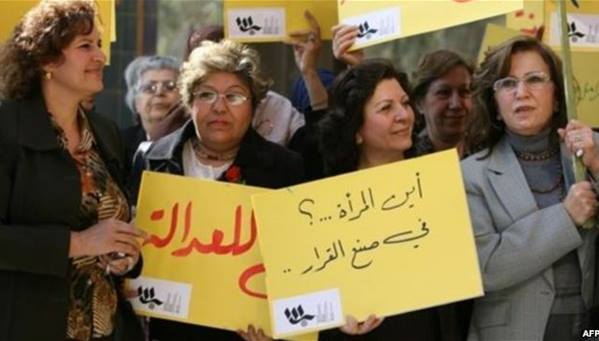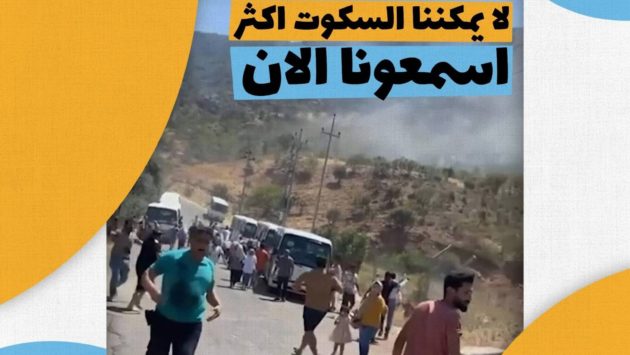Iraq’s Hit — City of Fire — Recalls the Massacres of Daesh
Baghdad – Bara Al-Shammari, Salam Al-Jaf
28 April 2020
The people of the western Iraqi city of Hit, the third largest city in Anbar province after Fallujah and Ramadi, are celebrating the fourth anniversary of the liberation of their city from the control of Daesh. In late April 2016, after violent battles involving regular Iraqi forces, tribal fighters, and groups from the “popular mobilization,” with extra support from the U.S. and British air forces (both acting as part of the international coalition’s efforts to combat terrorism) all of the city’s neighborhoods were liberated from the grip of Daesh. This came after Daesh carried out massacres inside the city, including throwing victims with stones tied to their feet into the river, executing innocent men and women and leaving their dead bodies hanging in the main street in the city for days. These horrifying acts of violence were some of the methods Daesh used to spread terror in order to force into submission those Hit clans who refused to pledge allegiance to the former leader, Abu Bakr Al-Baghdadi.
The battles which led to the liberation of Hit from occupation by Daesh were called “Desert Lynx.” The operation began on 19 March 2016, and was implemented across several regions of the province, primarily those of Al-Bunmur and Al-Boutiban, including the towns of Kabisa, and Al-Baghdadi. After almost a month of continuous fighting, on the morning of 14 April 2016, Iraqi forces were able to storm the city and take control its center, while Daesh was forced to withdraw to the villages bordering the Euphrates River. The full liberation of Hit and its surrounding villages from Daesh control was announced on 15 April of that year.
For the past several days, residents of different neighborhoods in Hit have recalled a period in their past described as a black cloud that passed through their city — this cloud represents the horrendous crimes committed by Daesh as well as mistakes made by the military as it tried to liberate the city. Thousands of innocent people were left dead and injured, and the fates of hundreds of others remains unknown. As in other cities, there are many residents, particularly men, whose fate remains unknown even now, 4 years later. Rumors circulate in the city now accusing armed factions linked to Iran of kidnapping missing city residents.
The Assyrian city of Hit literally means “the city of fire”, because it contains natural hot springs and bitumen wells. It is inhabited by just over 300,000 people, and is located at a crossroads in Anbar Governorate, between the southwest, heading to Jordan and the northwest, towards the border with Syria. The city is 180 kilometers from Baghdad and 70 kilometers from the city of Ramadi, the capital of Anbar Province. Hit is surrounded by the Euphrates River on three sides and is an important food basket for Anbar. It is home to a number of Islamic monuments, some of them belonging to the era of the Islamic conquests of Iraq. It was previously known as the political capital of the Communists in the province and is a cultural center, home to many intellectuals and artists.
The head of the security committee in Anbar Provincial Council, Naim al-Kaoud, reported that the city’s residents celebrated the anniversary of its liberation from Daesh control, a date they consider a new beginning, an opportunity to rebuild their city. Still though, the memories of Daesh are black and hateful and difficult to erase; so many residents were brutally and senselessly killed, and many others were displaced and to this day are without homes.
In an interview with Al-Arabi Al-Jadeed, Al-Kaoud stressed that the city of Hit suffered several massacres under occupation of Daesh. In addition, he confirmed that “the families of the victims have not yet received compensation, but they have been able to restore their lives since the security situation in the city has stabilized.” Al-Kaoud continued, saying that “Hit has become safe again after being freed from Daesh’s grip, but today we watch as many members of Daesh are being released because of insufficient evidence to convict them. This has led to a fear that Daesh gangs are forming in the desert areas.” The area north of Hit is a desert region that extends to the borders with the provinces of Salahuddin and Nineveh, to the north. But even given this threat, he asserted that the security forces, the tribesmen, and residents of Hit are ready to face up any challenge by residual Daesh fighters.
Yahya Al-Muhammadi, a member of the Iraqi parliament from Anbar province, sees the liberation of the city of Hit as representing one step in the liberation of Anbar, pointing out in an interview to Al-Arabi Al-Jadeed that Hit was liberated due to the efforts of the Iraqi forces and in cooperation with its residents who today enjoy security, peace and stability. In fact, the city is undergoing a reconstruction campaign marking a new beginning for the city.
Speaking about the security situation, Al-Mohammadi said that some cities located west of Anbar “are subjected to attacks from time to time, as they are close to the desert,” explaining further that “large areas of desert adjacent to the western cities of the province have not been and cannot be secured, which is a source of concern For the people.” In his view, the presence of the security forces and the “clan buildup” prevented Daesh attacks in Hit: Iraqi forces had made bunkers and built tunnels on the outskirts of the city heading towards the desert and this made Hit secure. “But,” he said, “this does not mean that the anxiety of the people is gone completely. There is still a lingering fear amongst some that Daesh is deep in the desert.” Despite this persistent worry, he stressed that Hit residents work hard at resuming “normal” life, confident that the security forces are “working to the best of their capabilities.”
Ahmed Al-Nimrawi, one of the tribal leaders who participated in the battle to liberate Hit, considers the air strikes that targeted the leaders and members of Daesh as having the greatest impact in dismantling the strength of Daesh forces who were hiding inside the city. In addition to the focused attacks carried out by counter-terrorism agencies, with support from the army and police, Al-Nimrawi highlighted the important role played by tribal fighters during the battles in an interview he gave with “Al-Arabi Al-Jadeed”. These groups provided Iraqi forces with accurate information about Daesh gatherings, as well as the knowledge about hidden entry points into the city.
The former Iraqi army officer, Muhammad al-Hayani, told “Al-Arabi Al-Jadeed” that the liberation of Hit brought the city back into national consciousness; after Daesh had isolated it from the rest of Iraq. But he also warned of the ongoing dangers given that the organization still exists in the areas of the desert. Al-Hayani explained that “Daesh is still a threat and since the withdrawal of American forces from some bases, it is in the process of a rapid reorganization in the Anbar desert. This has created a number of issues for the region, including worries about the ability to detect the organization’s movements.” Al-Hayani went on to say that, “the Iraqi forces must be trained and able to access information early if they are to have the advantage of surprise. Shock must be used to their advantage if there is any hope of aborting future attacks by the organization.” On the other hand, he also stressed that the massacres committed in Hit offer critical lessons that must be faced up to honestly. There needs to be genuine awareness of what allowed the spread of Daesh ideology if it is to be prevented from returning in the future.
Mazen Mustafa, a teacher from Hit, asserts that the living nightmare that the city went through from the end of 2014 until its liberation is difficult to describe. Daesh carried massacres on the city’s residents, especially from Boo Nemer clan. In his interview with “Al-Arabi Al-Jadeed”, Mustafa confirms that bodies were thrown everywhere, which caused citizens of Hit to flee the city in fear for their lives. Today, he went on “the conditions in Hit are stable in terms of security and construction, but many residents suffer from a lack of secure livelihoods due to Daesh’s destruction of the city’s infrastructure. Many residents are still not receiving any government compensation.”




